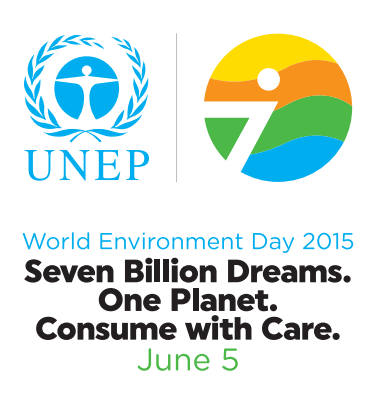World Environment Day 2015
Discussion details

World Environment Day is celebrated each year on 5 June.
World Environment Day (WED) is the United Nations’ principal vehicle for encouraging worldwide awareness and action for the environment. Over the years it has grown to be a broad, global platform for public outreach that is widely celebrated by stakeholders in over 100 countries. It also serves as the ‘people’s day’ for doing something positive for the environment, galvanizing individual actions into a collective power that generates an exponential positive impact on the planet.
The WED theme this year is "Seven Billion Dreams. One Planet. Consume with Care." The well-being of humanity, the environment, and the functioning of the economy, ultimately depend upon the responsible management of the planet’s natural resources. And yet, evidence is building that people are consuming far more natural resources than what the planet can sustainably provide.
Find below messages from
1. Achim Steiner, UN Under-Secretary-General and Executive Director of the United Nations Environment Programme
2. Karmenu Vella, European Commissioner for the Environment, Maritime Affairs and Fisheries (video)
1. Message by Achim Steiner, UN Under-Secretary-General and Executive Director of the United Nations Environment Programme on the occasion of World Environment Day
Milan, 5 June 2015
Living in an increasingly globalized world, inhabited by 7 billion people, it is easy to underestimate the power of individual action. The annual World Environment Day reminds people across the globe that it is our personal choices that shape the world around us. Our daily decisions as consumers, multiplied by billions, have a colossal impact on the environment – some of them contribute to the further depletion of natural resources, others help to protect fragile ecosystems. Every time - the choice is ours.
The theme for this year’s celebrations, Seven Billion Dreams. One Planet. Consume with Care, emphasizes that personal responsibility each one of us bears for enabling inclusive and sustainable economic development while stabilizing and reducing the rate of resource use.
Today, unsustainable patterns of consumption and production are one of the major causes of the continued deterioration of the global environment.
There is no doubt that the "great acceleration" of the last 50 years has seen a rapid transformation of the human relationship with the natural world – more so than in any other period in our history – with escalating use of natural resources leading to environmental degradation.
We must ask ourselves what the consequences of this pace of consumption and trajectory of population growth—forecasted to reach nine billion by 2050—will be. Under current trends, global extraction of resources is set to reach 140 billion tonnes by 2050, compared to around 7 billion tonnes in 1900. This will probably exceed the availability and accessibility of resources, as well as the carrying capacity of the planet to absorb the impacts of their extraction and use.
We simply cannot afford the waste, as resources are diminishing and prices are rising. But there is still time to transform the challenges of dwindling and finite resources into opportunities that will promote prosperous economies and a healthy planet for generations to come.
I would like to invite everyone to imagine what the world would be like if each of the 7 billion people made one change towards a more responsible consumption of resources. I would like you to hold on to that vision and strive to make it reality—be it refusing to buy single-use plastic bags or riding a bike to work.
WED is the opportunity for everyone to realize the responsibility to care for the Earth and to become agents of change.
2. Karmenu Vella, European Commissioner for the Environment, Maritime Affairs and Fisheries (video)
https://twitter.com/KarmenuVella/status/606721658469154816
Log in with your EU Login account to post or comment on the platform.